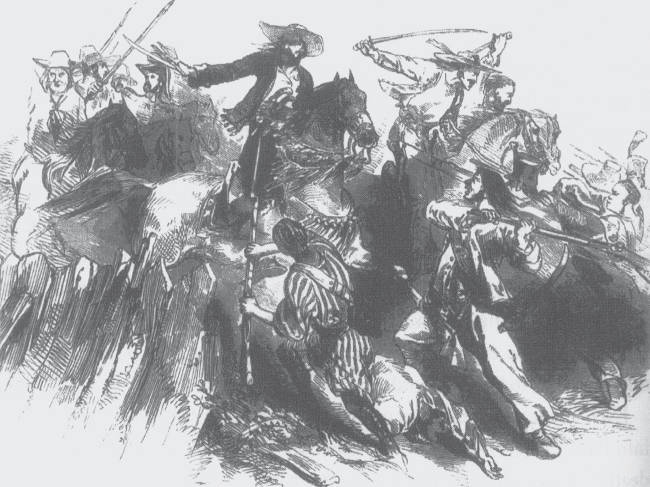Beyond America's Borders: Filibusters: The Underside of the Manifest Destiny
Printed Page 368 Chapter Chronology
Beyond America's Borders: Filibusters: The Underside of the Manifest Destiny
Filibusters: The Underside of Manifest Destiny
Each year, the citizens of Caborca, a small town in the northern state of Sonora, Mexico, celebrate the defeat there in 1857 of an American army. The invaders did not wear the uniform of the U.S. Army, but instead marched as the private "Arizona Colonization Company," under the command of Henry A. Crabb, a Mississippian who had followed the gold rush to California. When the governor of Sonora faced an insurrection, he invited Crabb to help him repress his enemies in exchange for mineral rights and land.
Crabb marched his band of sixty-eight heavily armed ex-miners south from Los Angeles, but by the time the Americans arrived, the governor had put down the insurgency, and the Mexicans turned on the American invaders. Every American except one died either in battle or at the hands of Mexican firing squads. Crabb's head was preserved in alcohol and placed on display as a symbol of victory.

Henry Crabb was one of thousands of American adventurers, known as "filibusters" (from the Spanish filibustero, meaning "freebooter" or "pirate"), who in the mid-nineteenth century joined private armies that invaded foreign countries throughout the Western Hemisphere. Although these expeditions violated the U.S. Neutrality Act of 1818, private American armies attacked Canada, Mexico, Ecuador, Honduras, Cuba, and Nicaragua and planned invasions of places as far away as the Hawai'ian kingdom. The federal government usually cracked down on filibusters, fearing that private invasions would jeopardize legitimate diplomatic efforts to promote trade and acquire territory.
Men joined filibustering expeditions for reasons that ranged from personal gain to validating manhood. Many saw themselves as carrying on the work of manifest destiny, extending America's reach beyond Texas, California, and Oregon, the prizes of the 1830s and 1840s. In addition, during the 1840s and 1850s, when Northerners insisted on containing slavery's spread to the North and West, Southerners became filibusters to expand slavery south beyond the U.S. border. A leading proslavery ideologue, George Fitzhugh, defended filibustering through historical comparison: "They who condemn the modern filibuster ...must also condemn the discoverers and settlers of America, of the East Indies of Holland, and of the Indian and Pacific Oceans."
One of the most vigorous filibusters to appeal to southern interests was Narciso López, a Venezuelan-born Cuban who dedicated himself to the liberation of Cuba from Spanish rule. López claimed that Spain was planning to free Cuba's slaves, and he told Southerners that "self-preservation" demanded that they seize the island. In 1851, after gaining the support of Governor John Quitman of Mississippi, López and his army invaded Cuba. The Spaniards crushed the invasion, killing 200 filibusters, shipping 160 prisoners to Spain, executing 50 invaders by firing squad, and publicly garroting López. John Quitman gathered another army of several thousand, but federal authorities intervened and ended the threat to Cuba.
The most successful of all filibusters was William Walker of Tennessee, a restless adventurer who longed for an empire of his own south of the border. In May 1855, Walker and an army of fifty-six men sailed from San Francisco to the west coast of Nicaragua. Two thousand reinforcements and a civil war in Nicaragua gave Walker his victory. He had himself proclaimed president, legalized slavery, and called on Southerners to come raise cotton, sugar, and coffee in "a magnificent country." Walker's regime survived only until 1857, when a coalition of Central American countries sent Walker packing. Walker doggedly launched four other attacks on Nicaragua, but in 1860 Honduran forces captured and shot him.
Filibustering had lost steam by the time of the U.S. Civil War, but the Confederacy paid a diplomatic price for its association with filibustering. The Guatemalan minister Antonio José de Irisarri declared that there was "no foreign Nation which can have less cause for sympathy with the enemies of the American Union, than the Republics of Central America, because from the Southern States were set on foot those filibustering expeditions." No Central American nation recognized Confederate independence.
The peoples of Central America and the Caribbean, like the inhabitants of Sonora, still harbor bitter memories of filibusters' private wars of imperialism and honor those who fought off American advances. In 1951, on the centennial of López's invasion, Cubans erected a monument at the very spot where his ill-fated army came ashore. Costa Ricans celebrate Juan Santamaria as their national martyr for his courage in battling William Walker. Memories of the invasions by nineteenth-century filibusters set the stage for anti-American sentiment in Latin America that lingers to this day.

How did supporters of filibustering justify the practice?

What was the relationship between filibustering and sectional politics in the United States in the 1840s and 1850s?

Why would an expansionist-minded U.S. government frown on filibustering?
CONNECT TO THE BIG IDEA

How did filibustering reflect the growing divide between the interests of free and slave states?